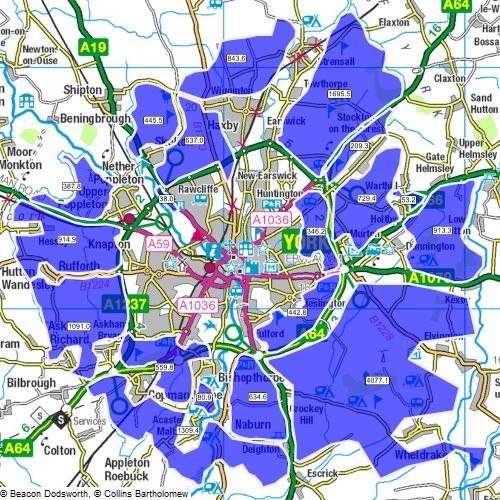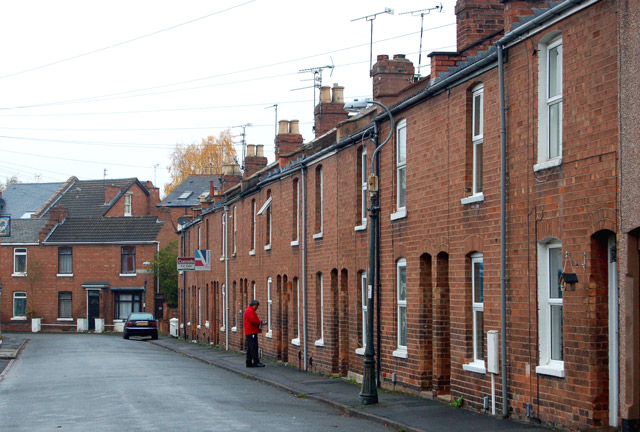posted by
Geoff on 27th Sep 2012
27th,Sep
This is work in progress and may change
A response to a the Call for Sites Consultation
from the City of York Council
September 2012

This is a submission for sites to be considered for development in York. The key issues concern
- The ownership of land and options on land
- The carbon footprint of new buildings
- The provision of housing that is truly affordable
- The growth of environmentally sustainable economic activity.
The ownership of land and options on land.
I have outlined most of the undeveloped land within the York boundary which avoids clusters of houses because their mixed ownership is likely to promote conflict. (e.g. The houses in a terrace of houses are likely to be owned by several different householders so nearby development would need their views to be taken into account.)
The area outlined in this submission is 15371.3 hectares. At ten homes to the hectare there is room for 153,713 dwellings. This is far in excess of York’s needs.
continue reading…
posted by
Geoff on 25th Aug 2012
25th,Aug
The BEEB may be the best we’ve got but they get important issues – like climate change – very wrong. To help them out I’m going to tweet advice to the BEEB (as @GeoffBeacon) and publish the tweets on www.tweetstothebeeb.com. Before the site goes live they will be here.
Tweets to the BEEB
—
WHYS Myles: Sandy a category 1 not the worst cat 5. ESA: largest Atlantic hurricane on record Explain!
—
Listened to about the rich keeping climate change off the agenda then tells me @OnePlanetBBC has been scrapped!
—
could get in by adding Logged here
—
WHYS Climate attribution …”one for the scholars not for ordinary people”? Scholar Myles Allen?
—
You better hide Bloomberg story somewhere obscure on your foreign pages Oh! You did.
—
@rogerharrabin @BBCAmos @davidshukmanbbc Frankenstorm Look for news on Jennifer Saunders – put her in your #BBCbalance
—
@JeremyLeggett @BBCNewsnight Jennifer Francis never mentioned by #BadBeebClimate EU also problem
—
@rogerharrabin Frankenstorm. So not too much can be read into “wierd weather”?
—
@rogerharrabin Jennifer Francis is “getting more attention as the weather careers from one extreme to another.”
—
@rogerharrabin Scientists saying no weird weather should be bbc-balanced with Jennifer Francis
—
flood season was in winter – now often in summer but no “long-term trend”. What??
—
Google news search “food climate site:” shames BBC reporting
—
The Mail reports Tim Lang on R4 BBC website doesn’t?
—
Vicki Hird: Climate change is already damaging food production... Ooh! Tuck it away at the end
—
@BBCAmos @davidshukmanbbc Greenland’s ‘Ice Quakes’ Record More to ignore here
—
@davidshukmanbbc ‘big melt’ … You may have your facts wrong. See wayne’s comment here
—
@davidshukmanbbc ‘big melt’ Why the quotes? And don’t mention food security!
—
@rincon_p Christoffersen knows little about what less sea ice does so ask JF.
—
Note for Connie Hedegaard, EU Climate Commissioner BEEB! Look too! @BBCAmos @davidshukmanbbc
—
continue reading…
posted by
Geoff on 29th Jul 2012
29th,Jul

Andy F [CC BY-SA 2.0 (http://creativecommons.org/licenses/by-sa/2.0)], via Wikimedia Commons
Terraces and slums
Attitudes to housing are often driven by style and prejudice. Urban terraced housing is a good example. As a boy in the fifties, I remember thinking it odd that the prime minister lived at 10 Downing Street, which was a terraced house – as if the country could not manage anything better.
This prejudice took many forms and created many disasters for people who lived in perfectly sound houses only to find that “the authorities” declared them to be unfit for human habitation so that they were demolished and the owners given a few pounds site value. The prejudice was built on real cases. The History of York website says this:
Joseph Rowntree’s son, Benjamin Seebohm Rowntree, undertook a comprehensive survey of the city’s poor in 1899. By that time, the Bedern tenements had gone, but Seebohm Rowntree still found evidence of appalling hardship.
Nearly 3,000 families lived in what Rowntree classed as sub-standard housing, many in slums. These were cramped, cold and dirty without proper water supplies and with overflowing privies shared by many households.
And this
The poor areas of York were filthy and stalked by disease. Human waste was left to accumulate in the alleys until there was enough to be collected and added to huge dung hills like those at Layerthorpe Bridge and behind St Margaret’s Church in Walmgate. Animal manure was added to the stinking heap.
Water supplies came from contaminated wells, the polluted Ouse and the stagnant Foss.
continue reading…
posted by
Geoff on 23rd Jul 2012
23rd,Jul
This was posted on the Labour Policy Portal in Septtember 2012. The Labour Policy Portal no longer operates. Thanks to Martin Leah for his help in editing.
Wealth distribution and the housing crisis
The planning system in the UK restricts the supply of buildings and other developments. This makes existing buildings as well as new developments more valuable. This wealth has not been fairly shared; it lies at the disposal of property owners. It is spent by people who inherit property, people who downsize and by the multitudes that are able to borrow against the value of this undeserved form of wealth generation. This takes from the poor and gives to the affluent and takes from the young and gives to the old.
The restriction on the supply of planning permission – not the shortage of land – that has caused the current housing crisis for not much more than 10% of the UK land area has been developed. Early returns from the recent census have led to headlines such as UK housing shortage turning under thirties into generation rent and Census reveals housing shortage. Search for “housing prices UK” and you will see the concerns even of the affluent classes: Parents have to house their grown children … and the grandchildren. The poor have been priced out of home ownership long ago.
continue reading…
posted by
Geoff on 2nd Jun 2012
2nd,Jun
Is EU Policy on climate seriously out of date? Can anyone help me find out?
European Commission waits for the IPCC Fifth Assessment Report
Last year a reply from the European Commission Directorate-General Climate Action told me that they rely on IPCC (Intergovernmental Panel on Climate Change) when making judgements about individual pieces of climate research. This also indicated that the Commission were actively engaged with the IPCC processes, in particular the Fifth Assessment Report, which they expect will produce new comprehensive climate assessments in the coming years.
But is this fast enough?
I have contacted them again to ask how newer climate science (and not several years old) can be fed into policy making.
continue reading…
posted by
Geoff on 16th May 2012
16th,May
At the Progress Annual Conference, Phil Collins of The Times, Peter Kellner of YouGov and Mary Riddell of The Daily Telegraph thought that a carbon tax to create jobs could become mainstream politics. The politician on the panel ducked the question.
They should read the article in the latest Fraser Economic Commentary (1), “The impact of the introduction of a carbon tax for Scotland”.
continue reading…
posted by
Geoff on 2nd May 2012
2nd,May
This article was originally published in the December 2011 edition of Challenge, the magazine of the Green Liberal Democrats. See also A market in prototype neighbourhoods.

0
The UK and the World face a century with multiple problems. Climate change will bring about problems of food and water security. The end of cheap energy, particularly cheap liquid fuel, will make economic growth difficult and some predict the retreat of globalisation. I believe the current planning system can be modified to help overcome these problems with important changes to the way we live – at home and in our communities.
The key mechanism is to allow and encourage more stringent planning permission criteria. These criteria should to be designed to achieve environmental sustainability, local jobs and local food production. To make this work it will be necessary to have financial mechanisms which can be used to reward or punish those that are granted planning permission.
The starting point is the recognition that the grant of planning permission can bestow enormous value on land owners. Local and national government control planning permission. They should use this to set a new agenda.
continue reading…
posted by
Geoff on 29th Apr 2012
29th,Apr
The UK Government and Climate Change
That’s been discussed here before:
posted by
Geoff on 27th Apr 2012
27th,Apr
The Royal Society: People and planet
Yesterday, the Royal Society published a report, People and the planet which (at last) recognises
Population and consumption are both important: the combination of increasing global population and increasing overall material consumption has implications for a finite planet.
So now “increasing overall material consumption” is a problem. To put that another way “economic growth is a problem”. Growth is too crude a measure for policy making. It’s an artificial construction of little practical use.
The authors avoid straightforward examples e.g. we Eat beef and starve the poor. Beef is one of those foods that take enormous amounts of production capacity – land, energy, water – squeezing out more productive foods. Just one example would help to convince me that they not only saw a problem but had the balls to tell us the things we must do to make it better.
continue reading…
posted by
Geoff on 24th Mar 2012
24th,Mar
There have been some interesting sessions at the House of Commons Climate Audit Committee.
Conventional coverage by the media largely covers the debate between official scientists (such as those in the IPCC) and the climate sceptics (or lying bastards as some of us call them). But for us cognoscenti the real debate is between the officials and the provisionals. The climate provisionals think climate change is much worse than the officials admit.
I don’t want to be disrespectful of those that have suffered in the complicated Irish tragedy and I have tried to think of alternatives to the terms “officials” and “provisionals” but I can find nothing else that has the right emotional power. The many tragedies that climate change is beginning to visit on the world will dwarf the troubles in Ireland.
continue reading…




